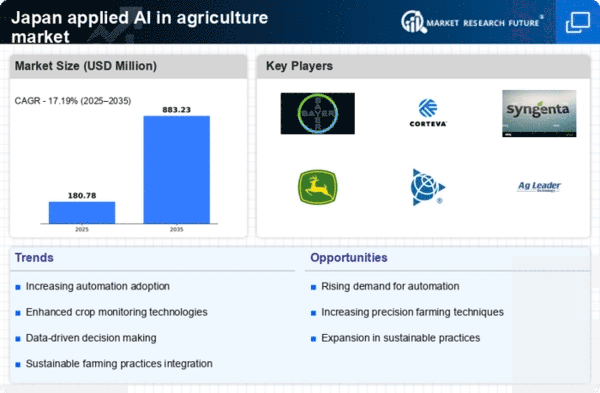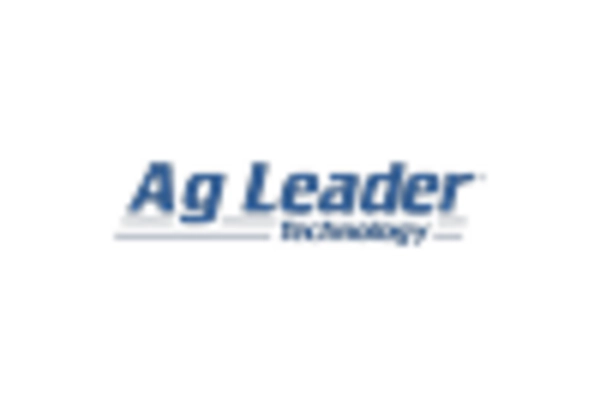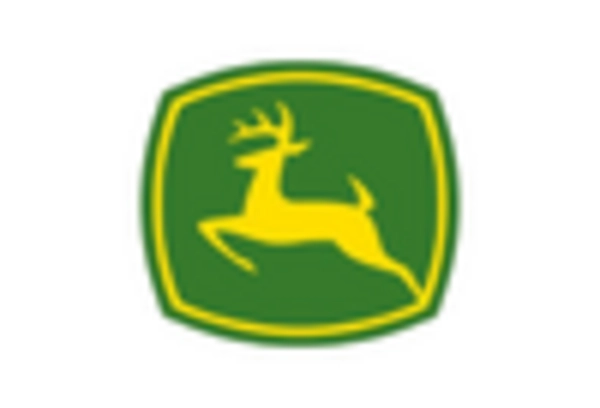Rising Labor Costs
The increasing labor costs in Japan are driving the applied ai-in-agriculture market towards automation and AI solutions. With a declining rural workforce, farmers are facing challenges in maintaining productivity levels. The application of AI technologies, such as autonomous tractors and drones, offers a viable solution to mitigate labor shortages. Reports indicate that labor costs in agriculture have risen by approximately 20% over the past five years. Consequently, the applied ai-in-agriculture market is likely to see a heightened demand for automated solutions that can enhance efficiency and reduce reliance on manual labor.
Technological Advancements in AI
The applied ai-in-agriculture market in Japan is experiencing a surge due to rapid technological advancements in artificial intelligence. Innovations in machine learning and computer vision are enabling farmers to optimize crop yields and reduce resource wastage. For instance, AI-driven systems can analyze soil health and predict weather patterns, allowing for more informed decision-making. The market is projected to grow at a CAGR of approximately 15% from 2025 to 2030, driven by these technological improvements. As farmers increasingly adopt these technologies, the applied ai-in-agriculture market is likely to expand, enhancing productivity and sustainability in the agricultural sector.
Data Analytics and Crop Management
The integration of data analytics in crop management is emerging as a key driver for the applied ai-in-agriculture market in Japan. Farmers are increasingly utilizing AI-powered analytics tools to monitor crop health, optimize resource allocation, and enhance yield predictions. These tools can process vast amounts of data from various sources, including satellite imagery and sensor networks, providing actionable insights. The market for data analytics in agriculture is projected to grow significantly, with estimates suggesting a potential increase of 25% by 2030. This trend indicates that the applied ai-in-agriculture market will continue to evolve, driven by the need for data-driven solutions in modern farming.
Government Initiatives and Support
Government initiatives play a crucial role in the growth of the applied ai-in-agriculture market in Japan. The Japanese government has been actively promoting the integration of AI technologies in agriculture through various subsidies and funding programs. For example, the Ministry of Agriculture, Forestry and Fisheries has allocated over ¥10 billion to support research and development in agricultural AI applications. This financial backing encourages farmers to adopt innovative solutions, thereby increasing the market's potential. As a result, the applied ai-in-agriculture market is expected to benefit significantly from these supportive policies, fostering a more technologically advanced agricultural landscape.
Consumer Demand for Sustainable Practices
There is a growing consumer demand for sustainable agricultural practices in Japan, which is influencing the applied ai-in-agriculture market. As consumers become more environmentally conscious, they are seeking products that are produced using sustainable methods. AI technologies can assist farmers in implementing eco-friendly practices, such as precision irrigation and integrated pest management. This shift towards sustainability is expected to drive market growth, as farmers adopt AI solutions to meet consumer expectations. The applied ai-in-agriculture market is thus positioned to thrive in an environment where sustainability is increasingly prioritized.
















